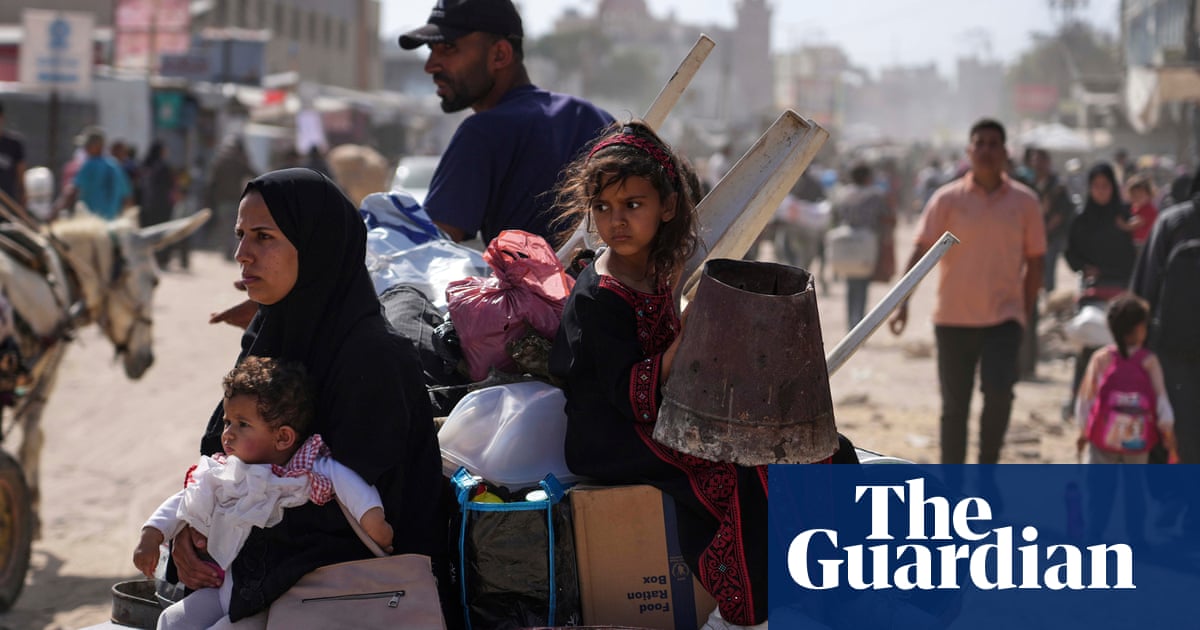Benjamin Netanyahu has vowed that Israel will “take control” of all Gaza, as three key allies attacked his “egregious” escalation of the military campaign and blockade on humanitarian aid.
Britain, France andCanadaattacked Israel’s expansion of its war as disproportionate, described conditions in Gaza as “intolerable” and threatened a “concrete” response if Israel’s campaign continues.
Earlier that day, Israel’s military declared an entire city a combat zone, airstrikes killed more than 60 people, and finance minister Bezalel Smotrich said Israel’s army would “wipe out” what remains of Palestinian Gaza.
“We will not stand by while the Netanyahu government pursues these egregious actions. If Israel does not cease the renewed military offensive and lift its restrictions on humanitarian aid, we will take further concrete actions in response,” the three allied governments said in a statement on Monday.
International pressure over a looming famine forced the Israeli prime minister to announce on Sunday night that he would ease the eleven-week siege ofGazato prevent a “starvation crisis”.
Nearly 24 hours later the UN said nine trucks of aid had been cleared to enter. This is less than 2% of daily shipments before the war, when Palestinians in Gaza were well fed and the strip had its own agricultural sector, and will make no meaningful difference to the crisis now gripping most of its 2.3 million population.
Britain,Franceand Canada described Israeli measures as “wholly inadequate”, warned it risked breaching international law and called for “a return to delivery of aid in line with humanitarian principles”.
Netanyahu’s decision to allow even a trickle of food in to Gaza had been attacked by far-right critics including members of his own cabinet. On Monday he shared a video on social media explaining his hand had been forced by close allies.
For weeks, Israeli officials insisted that there were “no shortages” in Gaza. But “senators” who are Israel’s “greatest friends in the world” had warned they would drop support for the country over images of starving Palestinians, Netanyahu said.
“[They told me]: ‘We cannot accept images of hunger, mass hunger. We cannot stand that. We will not be able to support you,’” Netanyahu said. He added that deepening desperation inside Gaza was taking Israel towards a “red line, to a point where we might lose control,”without clarifying what he was referring to.
He did not name his critical “friends”, but last week at the end of trip around the region – which did not include a stop in Israel – Donald Trump said“a lot of people are starving” in the strip, and claimed he would “take care” of the situation.
After he secured the release of a dual US-Israeli national hostage from Hamas last week, there had been hopes the US president would broker a lasting ceasefire for the entire strip. Instead, Israellaunched a new ground offensive inside Gazaalmost immediately after he left the region.
Heavy bombardments killed hundreds of Palestinians over the weekend. Strikes also targeted the strip’s battered hospitals, bringing the total toll from the war inside Gaza to 53,486, the majority of them civilians.
On Monday the Israeli military declared all of central Khan Younis city a “combat zone”, ordering civilians to leave. Most have been displaced repeatedly, are weakened by hunger and with much of the strip in ruins have nowhere to go.
Smotrich, a far-right critic of any negotiated end to the war, defended Netanyahu’s decision to let in “basic” food aid, saying it would allow Israel to keep its military in Gaza for a campaign of destruction and displacement.
“Now we conquer, cleanse and stay – untilHamasis destroyed,” he told a news conference. “Along the way, what remains of the strip is also being wiped out.”
“As part of the war, the IDF is moving the population out of combat zones … The population will reach the south of the strip, and from there, with God’s help, move to third countries underPresident Trump’s plan.”
Netanyahu claims a military justification for the blockade on Gaza, claiming Hamas steals food aid from humanitarian agencies and the United Nations.
There has been looting of warehouses by armed groups in Gaza, particularly as hunger deepened, but Israeli officials have not published data on how much aid is stolen, or given any examples of supply chains compromised by Hamas.
Humanitarian organisations with decades of experience working in conflict zones and heavily audited supply chains, say their aid is not being diverted.
Israel wants to replace their networks across Gaza with central distribution compounds secured by the Israeli military and operated by armed contractors who will hand out aid in boxes to those who able to walk and carry it.
A Swiss-registered start-up, the Gaza Humanitarian Foundation, which Israeli officials describe as a “US initiative” will manage the compounds when they are operational. Its director, Jake Woods, a former US marine, said the GHF would be “up and running before the end of the month”, but it is not clear who will pay for the aid.
The UN and international humanitarian groups who have brought food into Gaza since the war began have said they will not work with GHF, because its armed contractors and links to the Israeli military compromise key principles including neutrality and put staffers at risk.
Israeli foreign ministry officials declined to comment on funding.
Israel launched the war after cross-border attacks by Hamas killed 1,200 people, the majority civilians. Another 250 were taken hostage, with 58 still in Gaza – but nearly two-thirds of them are thought to be dead.
